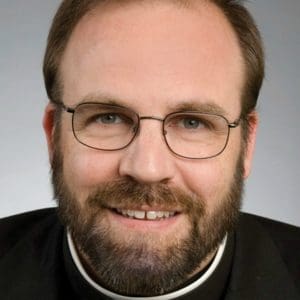Saints sometimes say daring things.
I’d like to reflect on a saying from St. Bonaventure. First, though, let’s consider a certain idiom he used, drawn from biblical times.
In Scripture, there is an “absolute” way of speaking that many of us moderns misconstrue. For example, Jesus says (quoting Hosea 6:6), For I desire mercy not sacrifice (Matt 9:13). To those untrained in Jewish and biblical idioms, the meaning would seem to be, “Skip all the sacrifice; God just wants you to be nice.” However, that misses the point of the idiom, which more accurately means this: “Practice mercy without neglecting sacrifice, for sacrifice is in service of mercy.” All of our rituals have the goal of drawing us to greater charity for God and neighbor. Caritas suprema lex (Charity is the highest law). Although charity is the highest law, that does not mean it is the only one. The basic Jewish and biblical idiom goes like this:
“I desire A, not B.”
This means that A is the goal, not B.
However, B is not to be neglected because it is a means or a way to A (the goal).
With all this in mind, let’s consider a teaching from St. Bonaventure, who wrote something very daring—even dangerous. Because he is a saint, we must grant him the liberty that we would not give to lesser men. As a saint, he ponders truth and is thoroughly reputable. In his sanctity, his thoughts go where words no longer “work.” In a sense, he must explode our categories lest we become locked in them and forget that God is greater than words or human thoughts can express.
St. Bonaventure wrote of a kind of “passover” we must make wherein we must pass from the world of words, categories, images, pictures, and preconceived notions; to God, who is mystically beyond all that. It is a moment when the “ology” (words) of our theology must step aside for the Theos (God) of our Theology. As you read this quote, remember the cautions and context we have just reviewed, especially regarding the “I desire A, not B” idiom.
For [our] Passover to be perfect, we must suspend all the operations of the mind and we must transform the peak of our affections, directing them to God alone. This is a sacred mystical experience. It cannot be comprehended by anyone unless he surrenders himself to it; nor can he surrender himself to it unless he longs for it; nor can he long for it unless the Holy Spirit … inflame his innermost soul ….
If you ask how such things can occur, seek the answer in God’s grace, not in doctrine; in the longing of the will, not in the understanding; in the sighs of prayer, not in research; seek the bridegroom not the teacher; God and not man; darkness not daylight; and look not to the light but rather to the raging fire that carries the soul to God with intense fervor and glowing love. The fire is God
[From The Journey of the Mind to God, by Saint Bonaventure, bishop (Cap. 7, 1.2.4.6: Opera omnia 5, 312-313)].
Unschooled readers will cringe at the apparent dichotomies: grace not doctrine, longing not understanding, sighs not research, bridegroom not teacher, darkness not daylight.
But this is why we studied the idiom beforehand. “I desire A, not B” means that B serves A, not that B is of no value. Thus, doctrine leads to and serves grace. Our teachings point to heights where words no longer suffice. Our understanding and intellect inspire the will to desire Him whom our minds could never fully contain or comprehend.
Thus our goal is not doctrine (precious and necessary though that this). Our goal is Him to whom the doctrine rightly points. Doctrine is the roadmap, the path, not the destination. Follow the map! It is foolish to try to invent your own religion. Yes, follow the map! But remember, the map is not the goal; it is not the destination. God is the goal and desired destination, and He cannot be reduced to our words or categories.
The great theologian Bonaventure knew the limits of theology. Theology makes the introductions and the foundation, set limits beyond which we may not go. But there comes a moment for silence and a dark night of the senses and even the intellect. Now the heart and the fiery light of God’s Holy Spirit must do His work. He will not overrule doctrine but build upon and transcend it.
St. Peter speaks to this same process:
We also have the message of the prophets, which has been confirmed beyond doubt. And you will do well to pay attention to this message, as to a lamp shining in a dark place, until the day dawns and the morning star rises in your hearts (2 Peter 1:18-19).
Yes, the prophets and the teachings must be attended to; they are like a lamp shining in a dark place. But there comes a moment when those teachings are confirmed and a greater light dawns, the Morning Star rises in our hearts. The truth of doctrine gives way to the Truth Himself, who is also the Way and the Light.
Listen to Bonaventure; listen to Peter. The Creed is essential. Memorize it and don’t you dare go off and invent your own religion! But there comes a moment when the creed steps aside and, pointing to God, says, “He is the one of whom I speak. Go to Him and sit silently at His feet.”
This post originally appeared in Community in Mission: Creating a Culture of Encounter and is shared with permission.
Image for this post used with permission of Unsplash.




